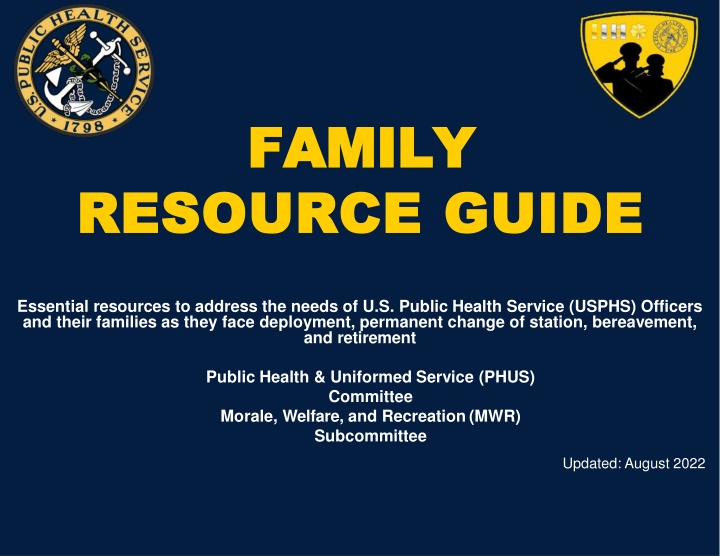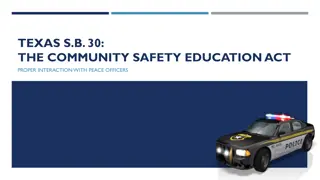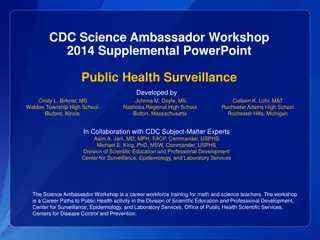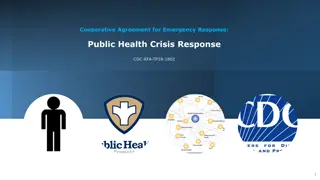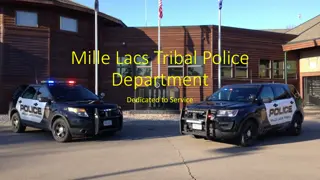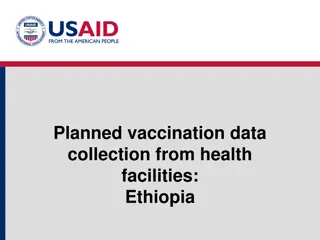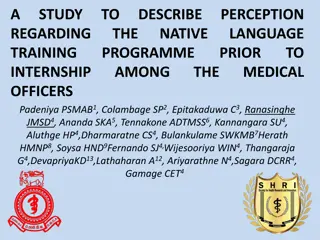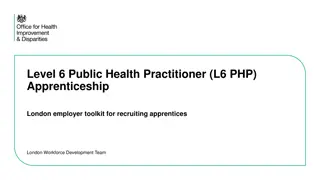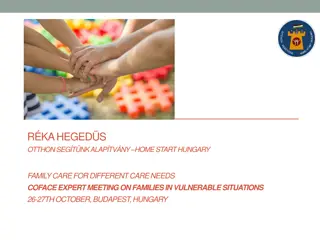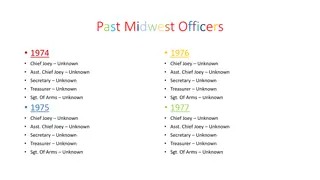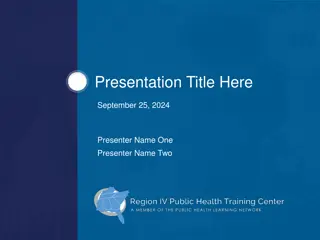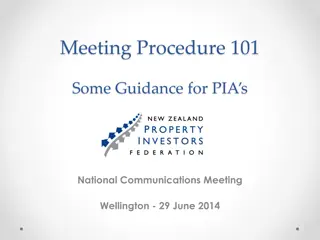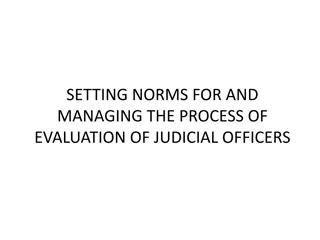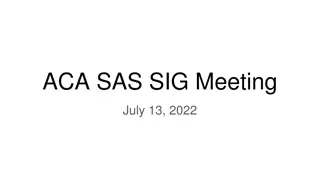Essential Resources for U.S. Public Health Service Officers and Their Families
This guide provides essential resources for U.S. Public Health Service (USPHS) officers and their families dealing with deployment, permanent change of station, bereavement, and retirement. It includes information on deployment resources, PCS resources, bereavement support, retirement planning, and more. The guide aims to enhance morale, provide access to quality of life information, and foster individual and group development for those serving our nation.
Download Presentation

Please find below an Image/Link to download the presentation.
The content on the website is provided AS IS for your information and personal use only. It may not be sold, licensed, or shared on other websites without obtaining consent from the author.If you encounter any issues during the download, it is possible that the publisher has removed the file from their server.
You are allowed to download the files provided on this website for personal or commercial use, subject to the condition that they are used lawfully. All files are the property of their respective owners.
The content on the website is provided AS IS for your information and personal use only. It may not be sold, licensed, or shared on other websites without obtaining consent from the author.
E N D
Presentation Transcript
FAMILY FAMILY RESOURCE RESOURCE GUIDE GUIDE Essential resources to address the needs of U.S. Public Health Service (USPHS) Officers and their families as they face deployment, permanent change of station, bereavement, and retirement Public Health & Uniformed Service (PHUS) Committee Morale, Welfare, and Recreation(MWR) Subcommittee Updated: August 2022
DISCLAIMER DISCLAIMER JOAG researches, compiles, and provides MWR resources for informational purposes only and does not advocate for MWR benefits with private companies/businesses. The appearance of external hyperlinks does not constitute endorsement by the United States Public Health Service (USPHS) of the linked websites, or the information, products, or services contained therein. The MWR Resource Guide does not promote or solely endorse any particular offerings through the resource links.
Table of Contents Table of Contents Table of Contents 1 About This Guide 2 Deployment Resources 3 Deployment Waiver Information 4 Permanent Change of Station 5-6 (PCS) Resources Bereavement Resources 7-10 Retirement Resources 11-13 Separation Resources 14 VA Resources 15 1
About This Guide About This Guide The JOAG MWR Family Resource Guide (FRG) was created to make PHS resources and information available to officers and their families regarding deployment, permanent change of station, bereavement, and retirement. The FRG outlines the most common PHS resources for officers and their families, while also providing quick links, and tools that will connect officers to additional information. The information provided in this guide is expected to achieve the following: 1. Accentuate and preserve our four core values: leadership, service, integrity, and excellence. 2. Provide links to no-cost or low-cost services and programs that increase officers morale. 3. Ensure real-time access to quality of life information and resources. 4. Encourage and expand activities that promote individual growth and group development, while fostering recruitment and retention for those serving our nation. 2
Deployment Resources Deployment Resources PHS Resources Non-PHS Resources Readiness and Deployment Branch (RDB)-Readiness tab of CCMIS Pre-Deployment Guide for Civilian DOD workers Military FamilyAssociation RDB Self Service (within OSA of CCMIS) Preparing Children for Deployment Tricare Deployment Package/Check list (example) Deployment and Transition-Military One Source JOAG Readiness and Deployment Committee Information USPHS Corps Care: PHSCorpsCare@hhs.gov 3 3
Deployment Waiver Deployment Waiver Information Information Primary reference for waiver information is the CCMIS website, Medical Affairs under Medical Waiver Program. The Active Duty and Reserve Corps Medical Waiver Request form must be accompanied by detailed medical documentation from the officer s provider(s), to include: condition/diagnosis and/or symptoms, treatment, reason it interferes with deployment, and length of time. Combine all documents as a single PDF and upload file to CCMIS Officer Secure Area (OSA) via eDOC-U, Medical Affairs category as Request for Medical Waiver. Officer will receive email notification of submission. Archived documents are not visible to officers at this time. Waivers are generally processed within two business days of upload and can be viewed in the Officer Secure Area in the RDB Self-Service section. For more information, please contact Medical Affairs at: PHSMACCHQ@hhs.gov. 4 4
Permanent Change of Station (PCS) Resources Travel and Transportation Allowances Tips for a Move PCS Checklist Checklist for Spouses New to the Military (includes PCS information) Deductible PCS Taxes Shipping Household Goods Financial Tips for PCSing 5 5
PCS PCS R Resources Cont. esources Cont. PCS Preparation with A Pet (particularly for duty stations overseas) Different Types of Moves (e.g., deployment, PCS, PPM, local, overseas) and Basic Entitlements (e.g., retirement, separation) An Active Member Can Receive Military Spouses Residency Relief Act (MSRRA) (allows military spouses to keep residency in their home state if the service-member receives PCS orders) PCS- Selling: Five Ways to Prepare Your home for Market PCS- Buying: How Much Can I Afford? *Click on each underlined resource for further information 6 6
Bereavement Resources Bereavement Resources Active-Duty Death Entitlements (CCI 383.01) Death Gratuity: The death gratuity is a one-time lump sum payment of $12,420 (tax exempt) for a member, who dies on active duty. If the death occurred as a result of hazardous duty, the payment is $100,000. Unpaid Pay and Allowances: The beneficiary payment may include unpaid basic pay, payment for up to 60 days of accumulated leave, payment for travel, per diem expenses, transportation of eligible family members to funeral, and final shipment of household goods. Family Housing: The agency can allow family members to stay in government housing for up to 365 days if the death occurred in the line of duty. If the family moves out of government housing, Basic Allowance for Housing (BAH) is paid for the remaining unused days. 7 7
Bereavement Resources Cont. . Bereavement Resources Cont Servicemembers Group Life Insurance (SGLI): The SGLI payment is $400,000, unless the coverage was declined or the coverage was reduced by the member. Payments to the beneficiary are tax exempt. Survivor Benefit Plan (SBP)*: A monthly annuity payment will be made to the beneficiary of a member who dies on active duty. The initial payment is equal to 55% of the retired pay. When the surviving spouse reaches age 62, the payment is reduced to 35%. The payment is suspended if spouse remarries before age 55. There are new rules for surviving spouses who also receive Dependency and Indemnity Compensation (DIC) from the Department of Veterans Affairs (VA) regarding the phase out of the dollar-for-dollar reduction, by 2023. VA Education Benefits for Survivors and Dependents: The VA may pay the death benefit if the member dies on active duty and in the line of duty. The member must have been entitled to the educational assistance under the GI Bill. 8 8
Bereavement Resources Cont. Social Security Lump Sum Death Payment: Social Security Administration will pay up to a $255 lump sum death payment to the surviving beneficiary. Visit the nearest Social Security office for more details on death benefits. TRICARE Survivor Benefits: A surviving spouse remains covered during the transitional survivor period (three years following the sponsor s death) as "active duty family members. After three years, they transition to "retired family member" coverage. Surviving children remain covered as active duty family members until they age out of TRICARE or lose eligibility for other reasons. 9 9
Bereavement Resources Cont. TRICARE Dental: If your sponsor died while serving on active duty, you may qualify for the TRICARE Dental Program Survivor Benefit Plan. If you were using the TRICARE Dental Program when your sponsor died, you may be automatically transferred to the Survivor Benefit Plan. If not, you can enroll at any time. After three years, surviving spouses lose eligibility for the TRICARE Dental Program. They may purchase the TRICARE Retiree Dental Program only if their sponsor died while on active duty for more than 30 days. Surviving children can remain enrolled in TRICARE Dental Plan until they lose TRICARE eligibility for other reasons. 10 10
R Retirement Resources etirement Resources Transitioning from Commissioned Corps active duty to retirement is not always an easy task, but successful planning can be a big help. It is recommended that you begin planning at least five years prior to your target retirement date. So where do you start? Begin the preliminary planning process by asking yourself these three key questions: 1. Do I meet the minimum retirement eligibility? 2. Do I have enough years of creditable service? 3. Can I afford to retire? 11 11
Retirement Resources Cont. Retirement Resources Cont. 1. Do I meet the minimum retirement eligibility? Generally, you may retire from the Corps after completing 20 years of active service but less than 30 years of active service provided that at least 10 of those years were active duty commissioned service in any of the uniformed services. 2. Can I afford to retire? Retiring from a uniformed service can have a major financial impact if you re not prepared. For example, did you know that once you retire you will have to payfor TRICARE* health benefits and that your former spouse may be entitled to some part of your retirement pay? If you want your spouse and dependents to receive an annuity upon your death, you will also need to pay a premium under the Survivor Benefit Plan (SBP)*. Today may be a good day for you to start planning a new budget based on all your estimated income sources and expenses. (Continued on next slide) 12 12
Retirement Resources Cont. Retirement Resources Cont. 2. Can I afford to retire? The following links offer some information to assist officers in making this critical decision. However, they are just helpful guidance, and each officer will have to answer this question on theirown. Retirement Income Retirement Income Cont. Computing Retired Military Pay Additional Links Vets First Military Separation Guide Social Security Blended Retirement System Financial Field Manual and Military Finances Special Report Military Survivor's Benefits Blended Retirement FAQ Thrift Savings Plan Taxes State Taxes on Military Retirement Medical and Dental Retiring 13 13
Separation Resources Separation Resources Other separation resources can be found at the PHS Separations website. These can include any situation where an officer separates from the Commissioned Corps before their retirement eligibility date. 14 14
VA VA R Resources esources (Separation or Retirement) (Separation or Retirement) Retired/separated PHS Officers are eligible for VA Disability Compensation, a tax-free benefit paid to Veterans with disabilities which are the result of a disease or injury incurred or aggravated during active service ( service connected ). The degree of disability is expressed as a percentage and is designed to compensate for loss of working time from exacerbations or illnesses and takes into account the number and type of dependents. Officers are not entitled to a VA Disability Compensation until after retirement/separation. The VA bases their decisions on the Veteran s medical history and VA provider disability examinations. VA disability ratings can be fluid based on the condition, some are permanent while others are reviewed periodically. In order for payment to be retroactive back to the day after retirement/separation, a claim must be started within 1 calendar year of retirement/separation. To assist in filing a claim you can use a representative from a Veterans Service Organization (VSO) as they are trained by the VA. 15 15
A Acknowledgements cknowledgements MWR Subcommittee Members & Contributors (2020-2022)T Joshua Woods, Secretary PHUS Committee Co-Chairs: LCDRs Gwendolyn Hudson, Christine Lloyd, & Kodilichi Echeozo MWR Co-Leads, LCDR Gene Crisp and LT Marlise Williams CDR Gail Tarlton LCDR Solita Cuthrell, LCDR Olive Davies-Cole LCDR Elizabeth Devlantes LCDR Melanie Fowler LCDR Jasmeet Kalsi LCDR Jamila Mwidau LCDR Toscha R. Stanley LCDR Olive Taylor LT Shardae Bartley LT Joshua Woods Special thanks to the JOAG Executive Committee for their support and guidance during thisproject! 17
